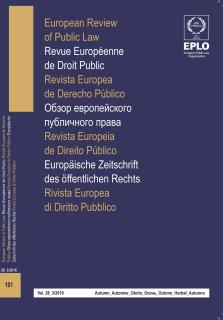
Doctor of Laws and lecturer (chargé de cours) at the University of Liège.
The author can be contacted at the following email address: f.bouhon@ulg.ac.be
In light of the principle of equality, German, Belgian and British election law contain some legal rules that tend to distribute the faculty to influence the composition of the elected assemblies equally among the governed people, and others that tend to distribute it unequally. The inequality caused by the latter group may be to some extent legally justified by concerns for the general interest, but also provides rulers with means that help them to remain in power, which is hardly justifiable from a legal perspective. In these legal systems, parties are expected to gain a significant portion of the people’s support: not only should the parliament (as a whole) and its members (as individuals) represent the governed people, but the parties themselves are expected to be sufficiently representative of the people in order to access the legislative assemblies. Notably, this thesis draws examples from the case law of the European Court of Human Rights, from which relevant decisions are mentioned here.
Le droit électoral allemand, belge et britannique, examiné à travers le prisme du principe d’égalité, est constitué de deux catégories de normes dont la dynamique est opposée: certaines normes électorales tendent à distribuer égalitairement entre les gouvernés la faculté d’influencer la composition des assemblées élues, alors que d’autres tendent à distribuer inégalitairement cette faculté. L’effet inégalitaire des normes de la seconde catégorie peut être dans une certaine mesure juridiquement justifié par des objectifs d’intérêt général, mais cet effet assure aussi aux gouvernants - d’une manière difficilement justifiable en droit - des moyens de faciliter leur maintien au pouvoir. Dans ces systèmes juridiques, les partis constituent des objets de représentation: ce n’est pas seulement le parlement en tant que tel ou ses membres individuels qui doivent représenter les gouvernés, on attend aussi des partis eux-mêmes qu’ils soient suffisamment représentatifs pour accéder aux assemblées législatives. Cette thèse est notamment confortée par la jurisprudence de la Cour européenne des droits de l’homme, dont les décisions pertinentes sont évoquées ici.
* This article is based on a thesis prepared under the direction of Pr. Chr. Behrendt, which was presented on the 27th of March 2014 for a PhD degree at the University of Liège (Belgium) and later received an award from the European Group of Public Law (Thesis Prize 2015) for which the author would like to offer sincere thanks. The original work was published in French (Droit électoral et principe d’égalité. L’élection des assemblées législatives nationales en droits allemand, belge et britannique, Brussels, Bruylant, 2014, 1009 pages). A summarising article written in French about this study can be found in: Revue Internationale de Droit Comparé (R.I.D.C.), 2015, 439-458.





















